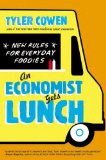Summary | Excerpt | Reviews | Beyond the Book | Readalikes | Genres & Themes | Author Bio

Critics' Opinion:
Readers' Opinion:
First Published:
Apr 2012, 304 pages
Paperback:
Feb 2013, 304 pages
 Book Reviewed by:
Book Reviewed by:
Elizabeth Whitmore Funk
Buy This Book
This is a book about food and eating, but it's not just a book about food and eating. Broader issues are at stake. Our attitudes toward food have a lot to do with our attitudes toward life and also toward ourselves. In the eighteenth century, James Boswell defined man as "a cooking animal" - so a foodie is a person interested in playing up one of the essential features of his or her humanity.
Do you remember those stories, from antiquity, of the Romans who vomited so that they might start again on a new feast? That represented a pretty special attitude toward food and enjoyment, although not one you'll find represented in this book.
Some commentators have viewed food as a means of social and political control. Charles Fourier, the nineteenth century French Utopian socialist, saw gastronomy as a pure science, and one that required elite culinary judges and juries to bring about the requisite "harmony." Fourier thought that sex and food should be the dual bases of control for the new social order, which he called "gastrosophy." Good behavior would be rewarded, by the guardians, with lots of food and sex and in that manner socialism would create incentives for economic cooperation and production. Fourier saw the Aristotelian virtue of moderation as an abomination. He predicted the future would bring five meals a day plus two snacks, all with delicious food. Men will be seven feet tall, digestion will be easy, and life expectancy will reach 144 years.
That's another food vision you won't find here. I like the optimism but I worry about the use of food as a mechanism for control. In fact this book is one way to take some control away from political elites or food elites. Most of all, my vision is about encouraging the individual diner and empowering him or her with some skills of pattern recognition and innovation.
I believe that people can do a lot better in life by cutting through some socially engineered illusions. Most of all, figure out when a food presentation or sale is about the taste of the food or when the food presentation is about something else, like acquiring higher social status or feeling good about yourself. For a few years running Noma, in Copenhagen, has been judged the world's best restaurant, but my meal there bored me (fortunately I was not paying). You can avoid a lot of so-so expensive restaurants by making sure you're paying for good taste rather than for social illusion. (Of course, you can invert some of my recommendations and read this as a manual of how, at the expense of better food, to buy higher social status.) I've focused on food, but there's nothing special about food markets in this regard; in many areas of life understanding is a powerful tool for getting what you really want.
I also view wise eating as a way to limit inequality. In the United States, it's often the case that wealthy people eat better than does the middle class or upper middle class. It doesn't have to be this way and I'm explaining how, even on a modest income, you can eat and enjoy some of the tastiest food in the world.
Ultimately, I hope these pages will show that becoming a better consumer of food can literally revolutionize the world.
An Economic Approach to Good Food
As a professional economist, I see food as the result of capitalist supply and demand. Whether it's the restaurant or the supermarket or the kitchen-supply shop, it's hard to think of a sector that is more commercialized and more replete with entrepreneurship and innovation. It is all monetized. If we care about food, we have to care about economic reasoning. The novel idea of this book is that knowing some dry scientific economics helps make every meal count in a deeply human way and it helps you realize - counterintuitively - that a lot of the best food is cheap rather than expensive.
Throughout, to find better eating, I will use this economic principle:
Excerpted from An Economist Gets Lunch by Tyler Cowen. Copyright © 2012 by Tyler Cowen. Excerpted by permission of Dutton. All rights reserved. No part of this excerpt may be reproduced or reprinted without permission in writing from the publisher.





The Flower Sisters
by Michelle Collins Anderson
From the new Fannie Flagg of the Ozarks, a richly-woven story of family, forgiveness, and reinvention.

The House on Biscayne Bay
by Chanel Cleeton
As death stalks a gothic mansion in Miami, the lives of two women intertwine as the past and present collide.

The Funeral Cryer by Wenyan Lu
Debut novelist Wenyan Lu brings us this witty yet profound story about one woman's midlife reawakening in contemporary rural China.
Your guide toexceptional books
BookBrowse seeks out and recommends the best in contemporary fiction and nonfiction—books that not only engage and entertain but also deepen our understanding of ourselves and the world around us.